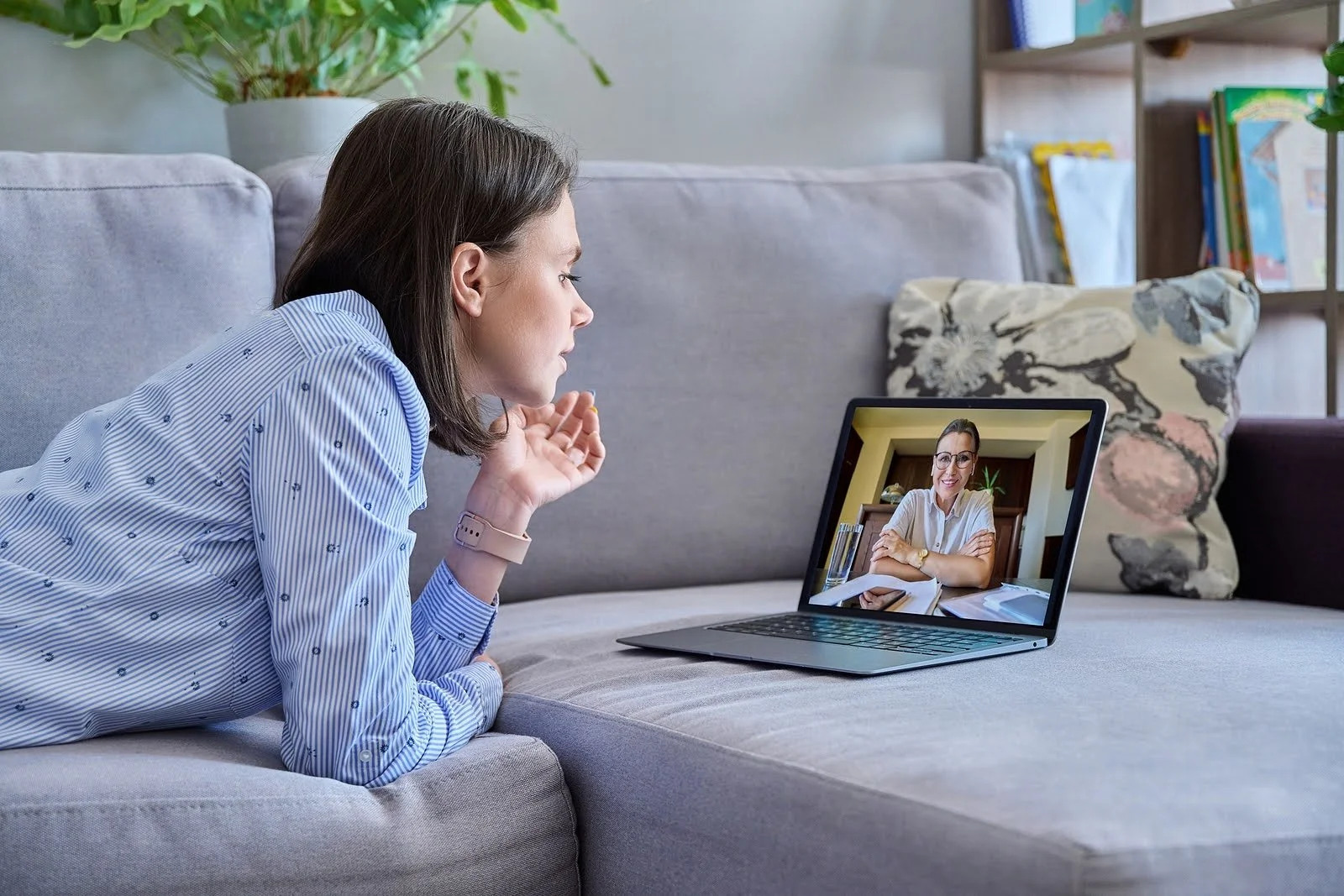In today's digital age, technology has opened up new possibilities in various aspects of our lives, including mental health counseling. Even with easier access to therapy, there are still factors that you should take into consideration to set yourself up well for success with your wellness journey. In this article, we will focus on a few tips for finding an online therapist and getting the most out of online therapy.
Finding a Therapist
When looking for a therapist, it’s important to collect some information and ask yourself a few questions to get a sense of what you’re looking for.
Know your budget
Will you utilize insurance or pay out of pocket? Get a sense of what your insurance might cover and what your budget might be. Sometimes insurance companies can provide you a list of therapists that are in-network with your insurance in your area, which can save you a lot of time! Many offices offer services on a sliding scale based on income, so be sure to ask if you need that option.
Know your schedule
Individual therapy is typically a weekly or biweekly commitment. Have a sense of your schedule and when you might be able to meet. Ask yourself, “Is this a regular commitment I can maintain? Am I able to fully focus to work on myself?”
Know your expectations for therapy
What are you looking to get out of therapy? What are your goals? By being able to articulate what you’re experiencing and where you’d like to go, you’ll be more precise in finding a therapist whose style works for you.
Map your options
A simple Google search about therapy will bombard you with an overwhelming amount of options for services. Websites such as Psychology Today and Therapy Den can be good resources that provide a good depth of information about different therapists and how to get in touch with them.
Determining Best Fit
One of the most important factors of successful therapy is your relationship with your therapist. Not every therapist will be a good fit and that’s okay. It’s important to trust yourself and give ample amounts of time and effort to see if you are a good match. Finding a good therapy match can be a goldilocks journey, so be patient until you find what’s just right! Here are a few tips for finding a match:
Take advantage of free consultations to interview your options.
Brief 15-minute consultations are a great way to learn more about a therapist, what they can offer, and have them answer any questions you might have.
Get a sense of what types of therapy a therapist practices and what types of interactions and activities you will be engaging with when meeting with them.
Pay attention to which styles of therapy resonate with you, seek out therapists with those orientations, and don’t be afraid to be open to different styles of therapy until you find what fits.
Get a feel for what working with a therapist might be like.
Likability is not the ONLY factor. Do you feel heard, understood, and safe in therapy? Could you trust them and does what they’re saying make sense as you work together? Your therapist may like you, but they are not your friend. You're not just looking for a friend to talk to about your week. A good therapist can give you space to vent or explore your feelings, and also challenge your perspectives, help you focus on your goals, and teach you new tools to reach them.
Don’t be afraid to switch therapists.
If it doesn't feel right after a few sessions, as in you don't feel comfortable or like you can open up, then it might be appropriate to share what you’re experiencing with your therapist and consider moving on. Conflict and rejection are hard, but termination is an unavoidable part of the counseling experience. Being honest and direct might be difficult, but it is often the best way for both parties to move on.. Therapists can often provide you with referrals to other therapists to try.
Session Preparation
Preparing before starting each session can often make a difference in how your experience goes. There are a variety of factors that can help facilitate the best experience possible. Here are a few things to consider:
Prep your environment:
Ensure you have a stable internet connection in a quiet, private space where you can concentrate without distraction. Interruptions can waste valuable resources and halt your therapeutic momentum. Set aside a few minutes before your session to test your tech and settings to get ahead of any potential issues. Utilize headphones or an external microphone to improve communication quality.
Prep your mind:
Reflect on any topics or issues you’d like to discuss further in therapy the morning of or write down any info that might be helpful in therapy as it occurs to you. Ensure that you’ve done your therapeutic homework or reflect on what got in the way of completing it. This will help with a sense of direction during the conversation and ensure that you get the most out of each session. Remember that therapy is work and you have to do your part!
During Your Online Therapy Session
Communicate openly and honestly:
Share your feelings, thoughts, and experiences openly with your therapist. Remember, your therapist is there to support you, and maintaining transparent communication is key to their understanding of your concerns. Your privacy is protected to help make it easier to get the best care you can!
Embrace non-verbal cues:
While online therapy may lack some of the non-verbal cues present in face-to-face sessions, there are still ways to incorporate them. Pay attention to your body language, facial expressions, and tone of voice during the session. Similarly, observe your therapist's non-verbal cues. These subtle indicators can provide valuable insights and contribute to a more nuanced therapeutic interaction.
Utilize virtual tools:
When doing online therapy, there are often a myriad of tools that can help facilitate a better therapeutic experience such as screen sharing or a collaborative whiteboard. These tools are especially beneficial and accessible for visually oriented people.
Session Aftercare
Take care of yourself: Therapy is work and can take both emotional and physical energy. With any form of therapy, it can be essential to practice self-care in order to maintain one’s general wellness. Dedicate some time before and after each session for relaxation or engaging in activities that help you unwind. Journaling, practicing mindfulness, or engaging in physical exercise are some ways to support your mental well-being alongside your online therapy sessions.
Connecting with your therapist virtually offers a viable solution for ongoing mental health support. By following these essential steps, you can ensure a smooth and meaningful therapeutic experience. Embrace the convenience and accessibility of online therapy while prioritizing privacy and open communication, allowing you to benefit from the guidance and support your therapist provides, even from a distance.
Take Action! Start Online Therapy in Asheville, NC Today!
Distance shouldn’t influence the quality of mental health services that are available to you. Our team of caring therapists would be happy to offer support with online and in-person support from Strive On Counseling. If you’re curious about online therapy and would like to more reach out to us for a free consultation.
1. Contact Strive On Counseling
2. Meet with a caring therapist
3. Start receiving support from the comfort of home!
Other Services Offered with Strive On Counseling
As Asheville therapists, we understand that every individual has a unique set of mental health needs. This is why we are happy to offer many forms of therapy. More specifically, our services include individual counseling, anxiety treatment, EMDR trauma therapy, therapy for men’s issues, mindfulness, Buddhist counseling, cognitive behavioral therapy, and online therapy. Some other resources we offer include guided meditations, supplements, a list of books and other useful resources, and online courses. If you would like more information about any of these services, please reach out today, and start doing therapy in North Carolina!




